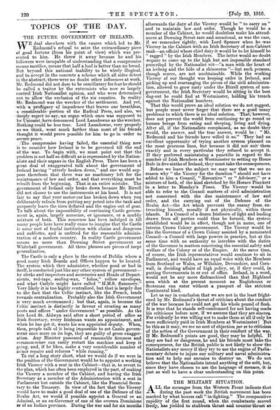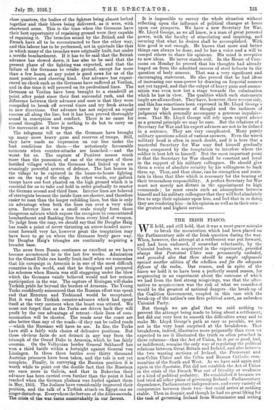THE MILITARY SITUATION.
A •LL the messages from the Western Front indicate that 11 during the past week the British movement has been marked by what boxers call " in-fighting." The comparative rapidity of the first round, when the combatants moved freely, has yielded to stubborn thrust and counter-thrust at close quarters, the bodies of the fighters being almost locked together and their = blows -being delivered, as it were, with shortened arms. This is the time when. the Germans have their best opportunity of regaining ground were they capable of regaining_it. The trenches seized. by the British and the French have all to be reconstructed to face the other way, and-thin labour has to be performed, not in .quietude like that in whichanany of the trenches were originally built, but under a terrific bombardment. If it has to be said that the British advance has slowed down, it has also to be said- that- the present phase of the fighting was expected, and that the failure of the Germans to- retake ground, except for more than a few hours,. at any point is good news for us of the most: positive and cheering kind. Our advance has experi- enced no check.such as the Germans have suffered at Verdun, and in due time it will proceed on its predestined lines. The Germans_ at Verdun have been- brought to a standstill at point after point since. their first successful rush, and the difference between their advance • and ours is that they were compelled to break off several times and try fresh attacks in new directions. Our advance has not enjoyed an equal success all along the line, but it has been proved thoroughly sound in conception and conduct. There is no cause for second thoughts. There is- nothing to do but to carry on the movement as it was begun.
The telegrams tell us that the Germans have brought up many more heavy guns and reserves of troops. Still, they have made no. impression on our line under the best conditions for them — the notoriously favourable Moments when counter-attacks are launched — and the worst for us. The capture of Pozieres means much more than the possession of one of the strongest of those fortified villages which the Germans had linked up in an amazingly powerful system of defence. The last houses in the village to be captured in the house-to-house fighting are on the top of the ridge. In. other words, our gallant troops have one foot planted on the high ground which it is essential for us to take and hold in order gradually to master the German second and third lines. Interior lines are beloved of strategists because the inside lines -are shorter, and therefore easier to man than the longer enfolding lines, but this is only an advantage when both the lines run over a very wide area. Interior lines on a small scale simply form those dangerous' salients which expose the occupiers to concentrated bombardment and flanking fires from every kind of weapon. To judge from the map, we should say that Sir Douglas Haig has made a point, of never thrusting an arrow-headed move- ment forward very far, however great the temptation may have been to go on where the Germans freely gave way. Sir. Douglas Haig's triangles are continually acquiring a broader base.
The news from Russia continues as excellent as we have become accustomed to in- the last few weeks. Admiration for the Grand Duke can hardly limit itself when we remember that his campaign in Armenia is in one of the most difficult countries in the world, and that he designed and prepared his schemes when Russia was still staggering under the blow which- the Germans vainly believed would end her serious participation in the war. The capture of Erzingan will shake Turkish:pride far beyond the borders of Armenia. The Young Turks-confidently announced that the Russian effort was spent and that Erzerum and Trebizond would be recaptured. But it was the Turkish counter-advance which had spent itself at the very moment when the boast was uttered. We must not forget that as the Turks are driven back they will profit by the one advantage of retreat—their lines of com- munication will be shorter. The roads near the coast are also better than any of the roadsif they can be called roads —which, the Russians will have to use. In fine, the Turks have still a fairly wide choice of defensive positions. But these obvious facts . do not detract in any way from the triumph of the Grand Duke in Armenia, which he has fairly overrun. On the Volhynian border General Sakharoff has won a third. battle within a fortnight against General von Linsingen. In these three battles over thirty thousand Austrian prisoners have been taken, and the tale is not yet complete. Finally, in surveying the Russian position it. is worth while to point out the double fact that, the Russians are once more in Galicia, and that in Bukovina their advance has been carried even further than the point it had reached when the German phalanx was hurled- against them in May, 1915. The Italians have considerably improved their position, and the talk of a Turkish attack on Egypt can no longer disturb us. Everywhere the fortune of the Alliesaseends. Tha_crisis of the:war,turns unmistakably in our favour., It is impossible to survey the whole situation without reflecting upon the influence of political changes at home upon- our. prospects. We have a new Secretary for War. Mr. Lloyd George, as we all know, is a man of great personal power, with the faculty of stimulating and inspiring, and securing that what he desires shall be accomplished. With him good is not enough. He knows that more and better' things can always be done, and he has a voice and a will to compel others to share his opinions. His mind is receptive to new ideas. He 'never stands stilL In the House of Com- mons on Monday he proved that his thoughts had already leaped on from the admitted success of steel helmets to the question of body armour. That was a very significant and encouraging. statement. He also proved that he had ideas of increasing our man-power by drawing on Iinperial sources not yet tapped, and that the output of heavy guns and ammu- nition was even now but a stage towards the culmination which he has in view. The qualities which such statements imply are all excellent. They have, however, their reverse side, and this has sometimes been expressed in Mr. Lloyd George's career by the looseness of thought and the rashness of judgment which generally accompany a generous impulsive- ness. That Mr. Lloyd George will rely upon expert advice as a general principle we may be sure. But the relations of a Secretary for War and his expert advisers are not to be defined in a sentence. They are very complicated. Many purely military questions admit of various answers. Even the wisest military head is often in much doubt, and it is here that a masterful Secretary for War may find himself gradually being conquered by the temptation to interfere where the soldier is best left to himself. But the most important point is that the Secretary for War should be constant and loyal in the support of his military colleagues. He should give them a sense of absolute security by his willingness to back them up. Thus, and thus alone, can he strengthen and main- tain in them that fibre which is necessary for the bearing of their tremendous responsibility. A perfect Secretary for War must not merely not dictate in the appointment to high commands ' • he must create such an atmosphere between himself and his military colleagues that they will feel absolutely free to urge their opinions upon him, and feel that in so doing they are rendering him—in his opinion as well as in their own— the greatest and highest service.































 Previous page
Previous page